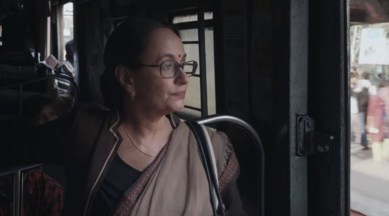Click here to follow Screen Digital on YouTube and stay updated with the latest from the world of cinema.

Adapted from Annie Zaidi’s short story The One That Was Announced, Sanjoy Nag’s Yours Truly is an affecting portrayal of routine loneliness. Much like her literary counterpart, Mithi Kumar (a compelling Soni Razdan) co-habits with solitude and commutes by the local train to go to work. Compelled to sit with strangers, she seems hardly perturbed: the multitude of people not apotheosising her situation, rather, acting as a cover. They enable her to look over them while she is being overlooked, to seek while she hides. Subsumed in her alone-ness, she gets rattled only when she is noticed, when approached by people. It is telling that the only time we see her initiating a conversation in the local train, we hear no reply from the other end — as if she is talking to no one in particular, almost thinking aloud.
It is then fitting that Nag’s protagonist is in love with the announcer at the station, one who regularly guides the commuters without being acknowledged, who speaks without being spoken to. He is a loner in the bustling station, just like her. Unlike the short story, we are not informed how she fell in love with him. By the time we are privy to her life, she is already rushing to the station, impatient to listen to his voice, and keeping some of his words, among those let out for all to hear, for herself.
Nag, who dealt with loneliness in a more definitive way in his 2010 film Memories in March (a mother comes to know of the sexual identity of her son after his death, and is left alone to grieve for him and come to terms with who he really was), is more nuanced this time around. In his latest film, he does not view loneliness as a condition contingent on something, rather as a continuous, pervasive state of being, and succeeds in presenting an intimate portrayal of loneliness and the lonely. It is most evident in the way he presents Mithi when alone, especially when she is writing letters or eating. It is just she who occupies the frame, as Nag resists the urge to show an empty chair next or opposite to her, implying how intrinsic loneliness is and how difficult and reductive to illustrate.
One might argue that this robs loneliness of its romanticism, making it seem mundane almost: Mithi does not suffer from the tragedy Banalata did, her heart does not shatter like the latter’s. She also lacks the brave heartedness Ila from The Lunchbox exhibited. Mithi, in her inability to languish, appears too regular, a misfit in the line of cinematic loners.
Sanjoy Nag lends an ordinariness to his character and Soni Razdan owns it without devaluing it. She flits between being sombre, petulant, compassionate and jealous and is particularly watchable in her scenes with her tenant (Pankaj Tripathi). She brings forth a playfulness, matching strides with the tenant. Though she remains uneven as the quasi-narrator of the story (she reads letters written to the announcer aloud), the pathos in her eyes fill in the silences like very few things do. She makes loneliness seem both generic and universal and not as the effect of the cause that is solitude.
Nag’s film soars precisely for revealing that it is loneliness that is inherent and infuriatingly constant, that it is not related to waiting for someone and is not dispelled when someone arrives. That it does not succeed a great tragedy and anyone can be and probably is lonely. And the title of the film serves as a comforting, compassionate way of confiding this.
Click here to follow Screen Digital on YouTube and stay updated with the latest from the world of cinema.